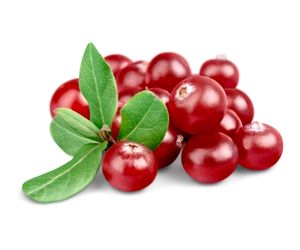Cranberries are a delicious and nutritious treat for your furry friend. If you want to feed your dog fresh cranberries, it is safe to do so as a treat or a small amount with their meal as they are a rich source of nutrients and contain a lot of antioxidants, prebiotic fibers (dietary fibers that feed the good bacteria in your dog’s gut), and other vitamins. Therefore, it is safe to give your dog fresh cranberries as a treat or a small amount with their meal.
Using dried or canned cranberries as a food source is not recommended because they are often high in sugar. And even also, keep in mind that frozen cranberries might be harmful to your dog’s teeth when chewed, so make sure to defrost them well before serving to your dog. On the other hand, fresh cranberries are highly nutritious and delicious so that you can give them to your dog. Wash the farm-fresh cranberries carefully so that all of the dirt is removed, and then it will be ready to feed them to your pet dog.
Fresh cranberries are a fantastic source of antioxidants. They are particularly high in quercetin, a plant pigment found in cranberries that aid in the stimulation of the immune system and has numerous other benefits, which we will discuss in this article.
What Are Cranberries?

Cranberries are the type of berries that are tiny in size, round in form, red in color, and hard to the touch. Cranberries have a bitter and sour taste, and they are primarily grown in the northern United States and southern Canada, where they are referred to as cranberries. However, cranberries are native to North America. They are freshwater plants that grow on vines. Everyone loves cranberries. You can even feed it to your dog too.
They grow more significantly than the plant’s leaves; they are initially light green before becoming red when fully ripe. It is edible, but it has an acidic flavor that frequently overpowers the sweetness of the fruit.
Cranberries are related to other berries such as bilberries, blueberries, and huckleberries, all of the Vaccinium subgenus members. Cranberries are categorized into three or four subgenera, each with three or four species.
Almost all cranberries produced are turned into sweetened dried cranberries, sauce, or jam. The rest are consumed as-is by consumers. Cranberry sauce is traditionally eaten with turkey at Thanksgiving and Christmas dinners in the United States, Canada, and the United Kingdom.
Cranberry Nutrient Values
Cranberry is high in antioxidants, dietary fiber, potassium, and various vitamins and minerals, all of which are quite healthy for your dogs to consume. Let’s look at the list of all the nutrients included in one cup or 100g of cranberries.
| Nutrients | Values as per 1 cup (100g) |
|---|---|
| Calories | 25 g |
| Protein | 0.25 g |
| Fat | 0.07 g |
| Carbohydrate | 6.6 g |
| Natural Sugar | 2.35 g |
| Fiber | 2 g |
| Calcium | 4.4 mg |
| Iron | 0.12 mg |
| Magnesium | 3.3 mg |
| Phosphorus | 6 mg |
| Potassium | 44 mg |
| Sodium | 1.1 mg |
| Zinc | 0.05 mg |
| Vitamin C | 7.7 mg |
| Folate DFE | 0.5 mcg |
| Vitamin A | 35 international units |
| Vitamin E | 0.72 mg |
| Vitamin K | 2.75 mcg |
| Water | 85% |
Cranberries also contain a range of vital B vitamins like vitamin B-1, B-2, B-3, and B-6
Benefits Of Cranberries
Due to their high nutritional value (as discussed above), cranberries are safe for your dogs. Read the following section to learn more about how cranberries can benefit your dog’s health.
Antioxidants In Cranberries: Several antioxidants, including anthocyanins, proanthocyanidins, and quercetin toxins, are found in cranberries and are essential in your dog’s diet because they aid in reducing oxidants such as drugs, chemicals, and other toxic substances, which accumulates over time in your dog’s system. Because of these oxidants, your dog may develop several serious diseases. This can even harm your dog’s cells. As a result, he might age more quickly. It has even been shown to cause DNA damage. All of this damage can result in degenerative disorders such as
- Arthritis
- Diabetes
- Kidney disease
- Cognitive dysfunction
- Cancer
Anti-Cancer: Apoptosis (anti-cancer cell death) can be aided by the consumption of cranberries by your dog. It may even be beneficial in the management of traditional cancer treatment and reduce the harmful effects of cancer and other types of drugs.
Control Urinary Tract Infections In Dogs: Cranberries are well-known for their ability to aid in the treatment of UTIs. UTIs in female dogs may be more common than in male dogs. Male dogs, on the other hand, can acquire them as well!
UTIs can cause discomfort and pain, and it is critical to treat them as soon as they are discovered.
Manage Gut And Immune Health: Cranberries can help your dog maintain a healthy digestive system. They destroy harmful bacteria, fungi, and viruses while causing no harm to bacterias that are beneficial for your furry friend.
Reduce Heart Disease Risk: Cranberries can help to lower your dog’s chance of developing heart problems such as congestive heart failure (CHF), heart murmurs, stroke, and dilated cardiomyopathy (DCM) by a reduction in blood clotting, lowering blood pressure, reducing arterial obstruction, lowering the risk of stroke, and even lowering the level of C-reactive protein in the blood.
Prevent Diabetes: Dogs who consume cranberries are less likely to develop diabetes. This is because it helps to lower blood sugar levels, blood glucose levels, and the fiber in cranberries, which helps reduce the risk of developing diabetes.
Promote oral health: Cranberries can help prevent bacteria from sticking to your dog’s teeth and gums by working as an antibacterial agent. In addition, cranberries include antioxidants that are beneficial to the oral health of your pet dog.
Prevent dehydration: Cranberries contain 85 percent water, which aids in preventing dehydration in your dog.
If you see any of the symptoms associated with any of the diseases listed above, you should consult your veterinarian as soon as possible.
Can Dogs Eat Cranberry Sauce?
Yes, dogs can eat cranberry sauce in small quantities as it’s safe for them to do so. However, some cranberry sauce contains high levels of sugar or preservatives, which might upset your dog’s stomach or cause diabetes. Therefore, if you wish to give your dog cranberry sauce, you should only give your dog pure cranberry sauce in small amounts. If you see any signs of an allergic reaction, you should contact your veterinarian or seek assistance from some pet professionals as soon as possible.
Can Dogs Eat Dried Cranberries?
Yes, you can give your dog natural dried cranberries. The problem is that many dried cranberries are found mixed with other berries and nuts such as raisins, sultanas, currants, or macadamia nuts, all of which are toxic to your dog. And even some dried cranberries may be added sugar or some preservatives, which can cause severe difficulties to your dog’s health. In case you notice any signs of an allergic reaction in your dog after eating dried cranberries. In that case, you should contact your veterinarian or seek aid from some pet professionals as soon as possible.
Can Cranberries Help Dogs With UTIs?
As per a research on Cranberries & UTI infections, there is controversial evidence whether Cranberry, cranberry juice, or pills help in reducing or treating urinary tract infections. Also, a UTI infection for your dog can be painful and may be a sign of other underlying diseases. Also, regularly feeding your pet dog cranberry juice can lead to kidney stones as the juice contains salts with calcium oxalate. So, we would suggest not using Cranberry as an alternative to medicine or consultation with a veterinary doctor.
How To Feed Your Dog Cranberries
You can give cranberries to your dog in a bit of amount. It can be raw, cooked, or dried, but it is only good in moderation. Don’t serve cranberry sauce or cranberry juice to your dog high in sugar and may include other ingredients that are possibly toxic for your furry friend.
You can feed different types of dog food containing cranberries as many dog food is available on the market containing cranberries and no sugar or other toxic ingredients. Or, you can prepare a homemade meal for your dog and add fresh cranberries to it, but only in small amounts.
Can Cranberries Be Fed Raw To Dogs?
Yes, raw cranberries are good for your dog, but only in moderate quantities. Natural cranberries are the ideal treats for your dog, and Cranberries should not be given to your little dog or senior dog if they have dental difficulties. In case your dog is sensitive to cranberries, you should avoid giving them raw cranberries to avoid allergies. If you see any signs of illness in your dog after he has had raw berries, you should consult with a pet specialist or consult with a veterinarian.
Can Dogs Eat Yogurt Covered Cranberries?
NO, yogurt mixed with cranberries is not good for your dog, and it may cause major problems for your dog if consumed in large quantities.
You can give your dog a small quantity of raw natural cranberries, which is beneficial to their health.
Can A Dog Overdose On Cranberry?
An overdose of Cranberry can cause gastrointestinal distress on your dog. Symptoms such as nausea, vomiting, diarrhea, and loss of appetite are possible. Suppose your dog exhibits any symptoms after consuming cranberries. In that case, you can address the situation at home by administering a 12-24 hour fast followed by a bland diet offered in tiny, frequent quantities until the symptoms disappear. If the symptoms persist, you should consult your veterinarian. Or consult with a pet expert.
Alternative Treats to Cranberries
When fed in small quantities, cranberries are harmless, and there are many fruits that dogs can eat. When fed in moderation, the following berries can be good alternative treats to cranberries for your dog to consume:
- Strawberries
- Blackberries
- Raspberries
- Blueberries
- Elderberries
- Cloudberries
- Gooseberries
- Mulberries
- Salmonberry
- Saskatoon berries
- Buffalo Berries
- Goji Berries
You can consult with your veterinarian or a pet expert to determine the best treats for your dog’s health and well-being.
